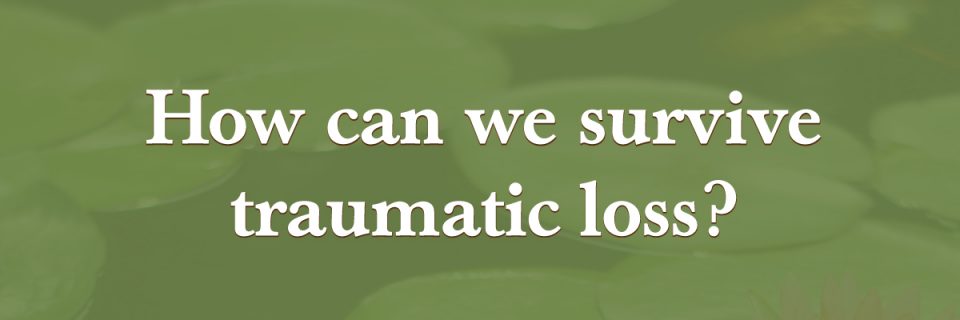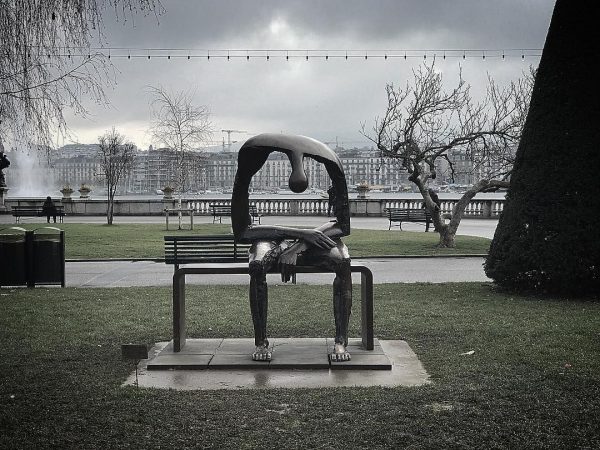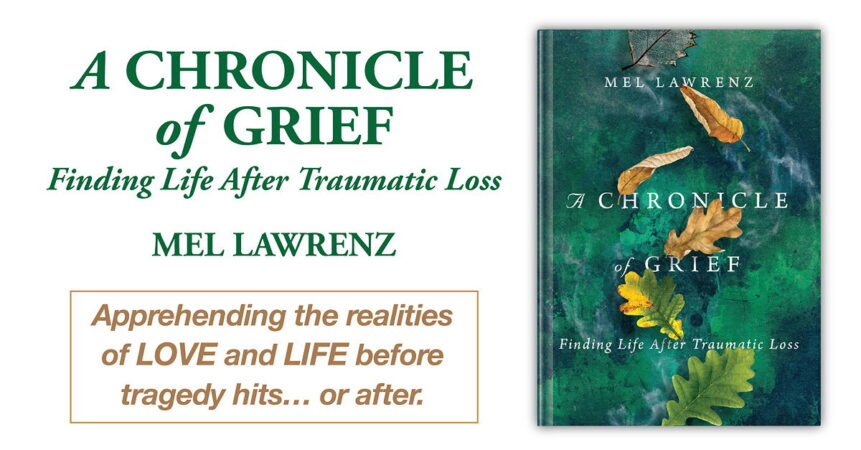
[adapted from A Chronicle of Grief: Surviving Traumatic Loss by Mel Lawrenz, IVP 2020]
Sometimes people say that their severe loss is like a hole in their hearts. It is so hard to describe that empty space, that tear in the fabric of the universe. When it happens we struggle to adjust to something or someone who is not there. We are adjusting to a negative space, which is completely different from adjusting to a new presence in our life, like when we find a new friend or take home a new baby. What is hard to describe is that we are not just sad about missing someone beloved. We are hearing a whistling wind coming from a space that was filled and is now empty.

You see this empty spot when you walk past the bedroom or look at that chair at the dinner table where no one sits now and there is less conversation, or that speed dial list on your cell phone with a name that goes absolutely nowhere. It is challenging enough in life to adjust to someone who has come into your life, more challenging still when it is someone who has disappeared. In that space they used to occupy, now an empty hole, is a loud silence.
Four months after our daughter died I was struck by how different each passing phase was. The early days had been so terrifying. I thought back to how it seemed, in those early days, that death was like a grizzly bear that had invaded the camp of our small family and dragged one away, and I lived with excruciating anxiety that this monster could at any moment drag someone else away without notice. I had to force myself to focus intently on the alternative view of death, that it is part of life, that life is a gift no matter how long, and that the providence of God guarantees that God’s love is never diminished. I remembered this sense that Eva was falling off a cliff right before my eyes, and my outstretched arm was not long enough to catch her.
But that moment had passed. There was this new reality that could not be denied. It was time to focus on this truth, and I said it over and over out loud: “Right now, Eva is not suffering. Right now, she is not in pain. I don’t have to rescue her.” I said it to myself, often out loud, over and over. It helped. It helped a lot.
The terror was gone now, but four months into it pain still lurked in any shadowy moment of any day or night. The emptiness of loss is constant. Ingrid and I can rejoice that we had thirty years with Eva, and that is good but it does not fill in the emptiness. No hug, no conversation, not the slightest sound of rustling from her room. Four months in and I was getting used to that. Reality had sunk in. Accepting a harsh reality is better than forgetting the reality. I would rather go through the day with this reality always within my peripheral vision rather than forgetting and in the quiet part of the day having the reality flash back to mind like getting hit in the head from behind.
How we need to understand the people in our lives who have gone through significant loss. One of the most purposeful things any of us can do is to show compassion and to be present with those who have suffered loss. We all have different preferred ways of doing that. Whether we prefer sending a card, or an email, or responding on social media, or having a face-to-face conversation, or picking up the phone, or sending flowers, that’s fine. We just need to do something. Don’t believe that the best thing is to give your friend or loved one space. In our case the cards and conversations were not a burden but a blessing. If we didn’t want the contact, we didn’t pick up the phone or we waited to open cards for a few days. We went out in public when we were ready. Those who grieve need to be able to call the shots.
We cannot ignore loss, and we must not multiply it. I am running into more and more people who have suffered one loss on top of another—within their families, in their jobs, in their churches. Some losses we cannot prevent. But we should avoid creating more loss.
There is nothing generic about grief. Somehow we have to have empathy. To try to understand. To put ourselves in the shoes of the mourner. At the same time, to realize that we will never comprehend what this particular loss means to this particular person. It is a kind of “empathy gap.” It’s no one’s fault. It is just inevitable. But knowing we have an empathy gap, we can choose to have compassion that goes as far as our comprehension and then something more.
Along the way, if it is indeed true that “faith, hope, and love” are “the things that remain,” then we rehearse what we really believe (faith), trust that things will be okay (hope), and cherish, cherish, cherish (love) those within arm’s reach and those who have slipped beyond. Love has no end.
[adapted from A Chronicle of Grief: Surviving Traumatic Loss by Mel Lawrenz, IVP 2020]


“This book is extraordinary. It is raw and real and at times hard to read, but it is also full of insight and hope….”
“Mel Lawrenz’s vulnerability and honesty in telling his story goes far beyond helpful. It penetrates into the places where faith is struggling to exist and just being human in daily life is almost too much to bear. He also reveals the pockets and places where hope lies — strange comforts and gentle revelations. This book is for anyone; those experiencing a great grief and those who walk through loss however small. That would be all of us. Beautifully and eloquently written, this is a book to get and a book to give.”
“As a mother who lost her son to suicide two years ago, I felt this book was honest, insightful and consistent with the best grief counseling available.”
“I have already given away several copies of this book to grieving parents. It’s beautifully written and searingly honest while offering hope for a life beyond loss.”
“It’s beautifully written, and it left me feeling hopeful and grateful for the advice that all of us will need at some point in our lives.”
“I read the book before I gifted it to my friend who lost her husband after a long illness…. Anyone who has suffered a loss in life will benefit from his thoughtful and heartfelt words.”
“A Chronicle of Grief is deeply moving, providing the reader with a path through their grief and sorrow. I highly recommend buying two -one to read/mark up, and the other to give away.”
“I came away from this chronicle of grief with renewed hope and encouragement. I’ve read a lot of books on grief over the years, but I would rate this one at the top. Authentic, truthful, and overflowing with hope.”
“Author Mel Lawrenz is an incredible writer. Having been through a sudden loss of a child, he’s well aware of the grief process and sensitive to a grieving person’s emotional and spiritual needs. It was the most helpful book I read and I read many. Loved it.”
“Beautifully written. No platitudes, just hard-won wisdom and truth. It gives hope to those grieving, and help for those walking alongside them.”
“I am so grateful for it in that it is a resource I can send to others in my sphere who are suffering from loss. The struggle to heal and move forward is real and I am so grateful for his inspiration. This is a book I have referred back to time and time again.”
“I, unfortunately, am in the same boat as the writer, in that I lost my son who was 18 years old. Died in a dreadful accident in front of writer’s (and my) church many years ago. One can’t understand the grief in burying your child, but when you suffer this loss, it helps to read a book like this.”
“Even though Lawrenz writes specifically about his experience losing an adult child, many of his reflections will ring true to people who have lost loved ones from other types of relationships. Lawrenz addresses common experiences of traumatic loss that supersede someone’s specifics, and this book can be a great comfort to people who are suffering from the death of anyone whom they have deeply loved. I would also recommend this book to pastors, counselors, and caring friends who want to know how to better support someone who is suffering from loss. Although this book speaks to one man’s specific experiences, its themes are universal, and this glimpse into everyday life after bereavement can help people better understand and support the grieving people in their lives.”
Your honest and self-revealing journey of grief moved me so touchingly, I sent my copy to a dear friend grieving the suicide of her grandson.
And then. my sweet, younger sister was killed by a reckless driver this past June. Unexpected, personally and violently traumatic. I ordered another copy to ease the sorrow during this present season of mourning. Again, I Thank you for your steady wisdom and your honest and complete transparency.
And yes, it is not either or. We lament. We praise.
Anne Owens
It has been six years since my husband went to his real home. He was. Wry sick with leukemia and when it was diagnosed he only lived three months. He died very well, never complaining and always praising God. We were married for 47 years. I still miss him and sometimes the grief is still raw but, God has blessed me so much through my three kids and even more through my church. Thank you for sharing your emotions. God bless you.
Thank you for sharing Mel…for being so real, honest, and vulnerable…I’ve walked down that same road and it took many years but the one thing I came to realize is that God’s doesn’t waste your pain. You’ve been such a help, comfort, and blessing to so many!